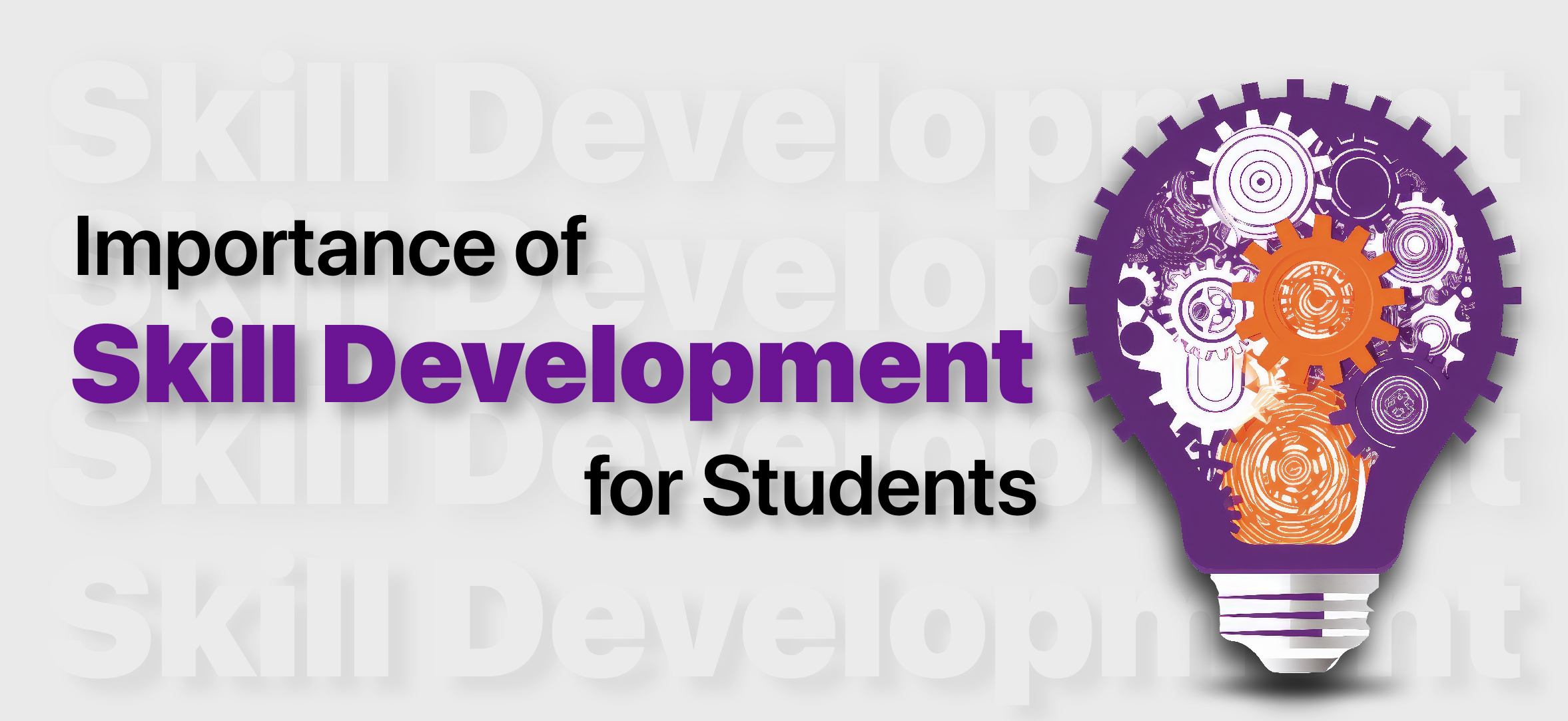The Importance of Skill Development for Students
Blogs Home
- 26 Oct 2023

In today's fast-paced and fiercely competitive world, the significance of skill development for students cannot be overstated. It is no longer sufficient to rely solely on traditional academic knowledge. To thrive in the ever-evolving landscape of the job market and to lead a fulfilling life, students must acquire a diverse set of skills. This blog post will delve into the importance of skill development, elucidating how it contributes to a student's holistic growth, employability, adaptability, entrepreneurship, problem-solving abilities, self-confidence, life skills, and academic success.
Holistic Growth
Skill development is a cornerstone of holistic growth for students. Beyond academic achievements, it cultivates a well-rounded individual who can navigate life's challenges with confidence and competence. When students engage in skill development activities, they tap into their creative potential, nurture their talents, and broaden their horizons. This holistic approach to growth encompasses physical, emotional, social, and intellectual facets, allowing students to become more adaptable and versatile individuals.
The Multifaceted Nature of Skill Development
Skill development isn't limited to one particular domain; it encompasses a wide range of skills that contribute to a student's overall growth. These skills can be categorised into various areas, including:
1.Technical Skills: These skills are specific to certain fields or industries, such as programming, data analysis, or mechanical engineering. Technical skills are essential for pursuing careers in specialised fields.
2. Soft Skills: Soft skills are interpersonal and communication skills that enable students to work effectively with others. These include skills like teamwork, leadership, and emotional intelligence.
3. Life Skills: Life skills are practical abilities that help students navigate daily life successfully. Time management, financial literacy, problem-solving, and decision-making fall into this category.
4. Creative Skills: Creative skills encompass artistic and imaginative abilities, including music, art, creative writing, and design. These skills foster innovation and self-expression.
5. Critical Thinking and Problem-Solving Skills: These skills involve the ability to analyse information, evaluate situations, and devise effective solutions. They are invaluable in both professional and personal life.
6. Adaptability and Resilience: Adaptability refers to the capacity to adjust to changing circumstances and environments, while resilience involves bouncing back from setbacks and adversity.
7. Entrepreneurial Skills: Entrepreneurial skills include creativity, risk-taking, and business acumen. They are vital for those interested in entrepreneurship or innovation.
8. Leadership Skills: Leadership skills empower students to take charge, inspire others, and guide teams toward common goals.
Employability
In an increasingly competitive job market, employers seek candidates who possess not only academic qualifications but also a rich array of skills. Skill development enhances a student's job prospects and employability. Employers value candidates who can bring a diverse skill set to the table, as these individuals are often more adaptable, versatile, and capable of handling a wide range of responsibilities.
The Transformative Effect on Employability
1. Competitive Advantage: In a job market characterised by fierce competition, having a broader skill set gives students a competitive edge. Employers often prefer candidates who can contribute to multiple facets of an organisation.
2. Diverse Career Paths: Skill development opens up a plethora of career options. It allows students to explore various industries and roles, providing them with the flexibility to pursue different career paths.
3. Career Progression: For those already in the workforce, skill development can lead to career advancement. It enables individuals to take on more complex roles and responsibilities, often resulting in higher positions and increased earning potential.
4. Adaptation to Industry Changes: Industries and job roles evolve with time due to technological advancements and market shifts. Skill development ensures that students remain relevant and adaptable, making them better prepared to navigate changes in their chosen fields.
Adaptability
The modern job market is characterised by rapid technological advancements and changing industry trends. As a result, the ability to adapt to new situations and acquire new skills is paramount. Skill development encourages students to embrace change and continuously upgrade their capabilities. By cultivating adaptable skills, students remain relevant and competitive in a job market that is in a constant state of flux.
The Necessity of Adaptability in the 21st Century
1. Technological Advancements: Technology is evolving at an unprecedented pace, affecting nearly every industry. Skills that are in demand today may become obsolete in a few years. Adaptability allows students to stay ahead in a tech-driven world.
2. Globalisation: The interconnectedness of the global economy means that businesses must adapt to different cultures, markets, and regulations. Adaptability is crucial for thriving in this diverse environment.
3. Changing Job Roles: Many traditional job roles are evolving, incorporating new responsibilities and technologies. Adaptability ensures that students can handle these changes and excel in their roles.
4. Continuous Learning: The concept of lifelong learning is gaining prominence. Adaptability facilitates the process of acquiring new knowledge and skills throughout one's career.
Entrepreneurship
Skill development nurtures the entrepreneurial spirit among students. Entrepreneurship is not limited to starting a business; it's a mindset characterised by innovation, creativity, and the ability to identify and seize opportunities. Through skill development, students learn to think outside the box, take calculated risks, and turn their ideas into reality. These entrepreneurial skills are invaluable, whether students embark on their ventures or contribute their innovative thinking to established organisations.
The Entrepreneurial Mindset
1. Innovation: Entrepreneurship encourages students to question the status quo and seek innovative solutions to problems. Innovation is the driving force behind progress and success in various fields.
2. Risk-Taking: Entrepreneurship instills the willingness to take risks, an essential trait for pursuing new opportunities. Students learn to assess risks, make informed decisions, and embrace uncertainty.
3. Resourcefulness: Entrepreneurial individuals are resourceful. They know how to leverage available resources and make the most of limited budgets and time constraints.
4. Persistence: Entrepreneurship often involves facing failures and setbacks. Developing a resilient attitude is crucial for overcoming obstacles and persisting in the pursuit of goals.
Problem Solving
One of the most valuable benefits of skill development is its contribution to students' problem-solving abilities. As students acquire new skills, they develop a toolkit of problem-solving strategies that can be applied to various aspects of life. They learn to analyse situations, identify challenges, and find creative solutions. These problem-solving skills are transferable, enabling students to tackle complex issues in both their personal and professional lives.
Problem-Solving Skills in Action
1. Effective Decision-Making: Problem-solving skills are closely tied to decision-making abilities. Students who excel in problem solving can make informed decisions by evaluating different options and their potential outcomes.
2. Critical Thinking: Skill development fosters critical thinking, which is the ability to analyse information, identify patterns, and make logical connections. Critical thinkers are adept at solving complex problems.
3. Conflict Resolution: Problem-solving skills extend to interpersonal relationships. Students who can effectively resolve conflicts are better equipped to navigate social situations and work collaboratively.
4. Innovation: Many innovations and breakthroughs result from creative problem solving. Students who develop this skill contribute to progress in various fields.
Self-Confidence
Mastering new skills has a profound impact on a student's self-confidence. When students acquire competence in a particular skill, they gain a sense of achievement and self-worth. This newfound confidence extends beyond the specific skill and permeates other areas of their lives. They become more willing to take on challenges, express their ideas, and pursue their goals with conviction.
The Confidence-Building Effect of Skill Development
1. Self-Efficacy: Skill development enhances self-efficacy, which is the belief in one's ability to accomplish tasks and achieve goals. As students master new skills, they develop a sense of self-efficacy that empowers them to tackle challenges with confidence.
2. Risk-Taking: Confidence encourages students to take calculated risks. They are more likely to step out of their comfort zones, explore new opportunities, and embrace uncertainty.
3. Communication: Confident individuals are better communicators. They express their thoughts and ideas with clarity and conviction, making them effective communicators in both personal and professional settings.
4. Leadership: Confidence is a key attribute of effective leaders. Students who exude confidence can inspire and motivate others, making them natural leaders in group projects and teamwork scenarios.
Life Skills
Skill development equips students with essential life skills that extend far beyond the classroom or workplace. These life skills encompass effective communication, time management, leadership, teamwork, and emotional intelligence. Students who possess these skills are better prepared to navigate the complexities of adult life, build meaningful relationships, and handle both personal and professional responsibilities.
Life Skills: Preparing for the Real World
1. Communication: Effective communication is crucial in personal relationships, workplace interactions, and everyday life. Students who develop strong communication skills can express themselves clearly and build better connections with others.
2. Time Management: Time is a finite resource, and effective time management ensures that students can juggle multiple responsibilities efficiently. This skill is vital for academic success and work-life balance.
3. Emotional Intelligence: Emotional intelligence involves recognising and managing one's own emotions and understanding and empathising with the emotions of others. It enhances interpersonal relationships and helps students navigate social situations with empathy and tact.
4. Leadership and Teamwork: Leadership skills are valuable in various contexts, including work, community involvement, and extracurricular activities. Teamwork skills enable students to collaborate harmoniously with others to achieve common goals.
5. Problem-Solving: Life often presents complex challenges that require problem-solving abilities. Developing this skill enables students to navigate personal and professional challenges effectively.
Academic Success
Skill development can have a positive impact on academic success. When students engage in skill-building activities, they enhance their cognitive abilities, critical thinking skills, and problem-solving capabilities. These skills are not only valuable in real-world scenarios but also in academic settings. Students who develop strong analytical and organisational skills are often better equipped to excel in their studies, leading to improved academic performance.
The Academic Benefits of Skill Development
1. Enhanced Learning: Skills such as critical thinking, problem-solving, and effective study techniques enhance the learning process. Students who develop these skills can grasp complex concepts more easily.
2. Better Time Management: Time management skills are essential for balancing coursework, assignments, and extracurricular activities. Effective time management leads to more focused and productive study sessions.
3. Improved Memory and Retention: Techniques for memory improvement and information retention, such as mnemonic devices and effective notetaking, enhance a student's ability to recall information during exams.
4. Efficient Research and Writing: Research and writing skills are fundamental in academia. Skill development in these areas results in well-structured, well-researched papers and presentations.
5. Test-Taking Skills: Effective test-taking strategies, such as time management during exams and techniques for managing test anxiety, can significantly impact academic performance.
Conclusion
In conclusion, skill development is a critical component of a student's journey toward personal and professional success. It contributes to holistic growth, employability, adaptability, entrepreneurship, problem-solving abilities, self-confidence, life skills, and academic success. As students embrace skill development, they prepare themselves to thrive in a competitive world where versatility and adaptability are highly prized.
Encouraging students to invest in skill development is an investment in their future, equipping them with the tools they need to lead fulfilling lives and make meaningful contributions to society. In a rapidly changing world, the ability to learn and adapt is a skill in itself, and by fostering this ability, we empower students to shape their own destinies and embrace a future filled with opportunities. Skill development isn't just about acquiring knowledge; it's about honing the capabilities that enable students to excel in every aspect of their lives. As educators, mentors, and parents, we have a crucial role in nurturing the next generation of skilled, adaptable, and confident individuals who will drive positive change in our world.
Mohd Burhan

Mohd Burhan is an Urdu postgraduate with a passion for cinema. Alongside his wanderlust, he leverages his expertise in tours and travels, offering a perfect blend of language proficiency and cultural immersion to his clients.




